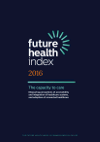 Royal Philips (NYSE: PHG, AEX: PHIA) today launched the results of the first edition of its Future Health Index (FHI), an extensive international study which explores how countries around the world are positioned to meet long-term global health challenges through integration and connected care technologies. In order to improve the quality, access and affordability of care, healthcare systems are increasingly shifting their focus from hospital-based acute care to new models of integrated, coordinated care along the 'health continuum,' from healthy living and prevention to diagnosis, treatment and home care.
Royal Philips (NYSE: PHG, AEX: PHIA) today launched the results of the first edition of its Future Health Index (FHI), an extensive international study which explores how countries around the world are positioned to meet long-term global health challenges through integration and connected care technologies. In order to improve the quality, access and affordability of care, healthcare systems are increasingly shifting their focus from hospital-based acute care to new models of integrated, coordinated care along the 'health continuum,' from healthy living and prevention to diagnosis, treatment and home care.
Examining the perceptions, behaviors and attitudes of patients and healthcare professionals, the Future Health Index focuses on three important factors necessary to move toward a more integrated system of healthcare: access to healthcare; integration of the current health system; and adoption of connected health technology devices and systems.
While the data illustrates the growing opportunity for digital technology to drive healthcare transformation, the Future Health Index also reveals varying levels of readiness across markets and unveils opportunities for improvement to encourage broader user adoption globally.
Three-quarters (76%) of healthcare professionals in developed markets agree their patients have access to the treatments needed for current and future medical conditions, versus just over half (58%) of those in emerging markets. However, emerging markets such as South Africa and the UAE appear to be leading the way in terms of connected device adoption, and more healthcare professionals in emerging economies expect connected devices to be used to manage health in the future.
The study, which will be run annually, was conducted in partnership with an independent global market research firm in 13 countries in recent months. More than 2,600 healthcare professionals and 25,000 patients were questioned in Australia, Brazil, China, France, Germany, Japan, The Netherlands, Singapore, South Africa, Sweden, UAE, U.K. and U.S.
Download: Future Health Index 2016 (.pdf, 8.487 KB).
Download from eHealthNews.eu: Future Health Index 2016 (.pdf, 8.487 KB).
About Royal Philips
Royal Philips (NYSE: PHG, AEX: PHIA) is a leading health technology company focused on improving people’s health and enabling better outcomes across the health continuum from healthy living and prevention, to diagnosis, treatment and home care. Philips leverages advanced technology and deep clinical and consumer insights to deliver integrated solutions. The company is a leader in diagnostic imaging, image-guided therapy, patient monitoring and health informatics, as well as in consumer health and home care. Philips’ wholly owned subsidiary Philips Lighting is the global leader in lighting products, systems and services. Headquartered in the Netherlands, Philips posted 2015 sales of EUR 24.2 billion and employs approximately 105,000 employees with sales and services in more than 100 countries.